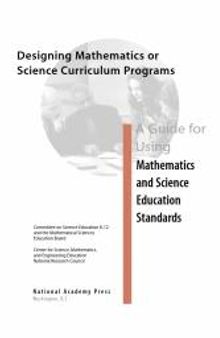 جزییات کتاب
جزییات کتاب
With the publication of the National Science Education Standards and the National Council of Teachers of Mathematics' Curriculum and Evaluation Standards for School Mathematics, a clear set of goals and guidelines for achieving literacy in mathematics and science was established. Designing Mathematics or Science Curriculum Programs has been developed to help state- and district-level education leaders create coherent, multi-year curriculum programs that provide students with opportunities to learn both mathematics and science in a connected and cumulative way throughout their schooling. Researchers have confirmed that as U.S. students move through the grade levels, they slip further and further behind students of other nations in mathematics and science achievement. Experts now believe that U.S. student performance is hindered by the lack of coherence in the mathematics and science curricula in many American schools. By structuring curriculum programs that capitalize on what students have already learned, the new concepts and processes that they can learn will be richer, more complex, and at a higher level. Designing Mathematics or Science Curriculum Programs outlines: Components of effective mathematics and science programs. Criteria by which these components can be judged. A process for developing curriculum that is structured, focused, and coherent. Perhaps most important, this book emphasizes the need for designing curricula across the entire 13-year span that our children spend in elementary and secondary school as a way to improve the quality of education. Ultimately, it will help state and district educators use national and state standards to design or re-build mathematics and science curriculum programs that develop new ideas and skills based on earlier ones?from lesson to lesson, unit to unit, year to year. Anyone responsible for designing or influencing mathematics or science curriculum programs will find this guide valuable.



 دانلود کتاب
دانلود کتاب

 جزییات کتاب
جزییات کتاب





 این کتاب رو مطالعه کردید؟ نظر شما چیست؟
این کتاب رو مطالعه کردید؟ نظر شما چیست؟
